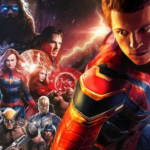Disney Pushes Next Two ‘Avengers’ Movies – ‘Doomsday’ Moves to December 18, 2026, ‘Secret Wars’ Moves to December 17, 2027
The Avengers Delay You Didn’t See Coming
Marvel fans, brace yourselves. Disney has officially postponed the release dates for the next two Avengers films, sending shockwaves through the fandom and Hollywood alike. The highly anticipated “Avengers: Doomsday” will now drop on December 18, 2026, while “Avengers: Secret Wars” follows on December 17, 2027. These seismic shifts come amidst an evolving MCU roadmap that’s reshaping how and when we’ll witness Earth’s Mightiest Heroes assemble next. For those tracking every twist in Phase 5 and beyond, this update is monumental.

Whether you’re a die-hard comic fan or a casual MCU viewer, staying ahead of the curve is crucial—and that’s why you should subscribe to marvelphase5, your go-to hub for timely Marvel news, trailer breakdowns, and spoiler-packed theories. In this article, we dissect what these delays mean for the future of the MCU, explore potential production reasons, and reveal the strategic advantages Disney might be banking on.
Disney Pushes Next Two ‘Avengers’ Movies – ‘Doomsday’ Moves to December 18, 2026, ‘Secret Wars’ Moves to December 17, 2027
The cinematic landscape of the MCU is undergoing a tectonic realignment. Disney has pushed back the release of two of its cornerstone films, signaling a long-game strategy for both narrative and market dominance. “Avengers: Doomsday,” initially anticipated to debut sooner, will now premiere during the high-stakes holiday window of 2026. Meanwhile, “Avengers: Secret Wars,” the supposed climax of the Multiverse Saga, is now slated for release at the tail-end of 2027.
This shift isn’t arbitrary. With the ongoing realignment of Marvel Studios’ slate following industry strikes, creative reshuffles, and evolving box office dynamics, the delay serves multiple strategic functions. It allows more time for script refinements, CGI polish, and potentially integrating newer characters like the X-Men and Fantastic Four. More importantly, it spaces out the content, combating superhero fatigue while aligning with broader Disney+ and theatrical release strategies.

Why Were the Avengers Films Delayed?
Several core reasons have been cited—both officially and speculatively—regarding these delays. First, the ripple effects of the 2023 Writers’ and Actors’ strikes cannot be underestimated. Key scripting stages were halted, actors became unavailable, and interconnected projects hit development bottlenecks.
Second, Disney is recalibrating Marvel’s release cadence following criticism of oversaturation. The studio appears committed to restoring the prestige of the Avengers brand. By delaying these tentpoles, Marvel ensures a polished final product while spacing out the content for greater impact and audience retention.
What Does This Mean for Marvel’s Phase 6 Timeline?
The delay of “Doomsday” and “Secret Wars” cascades across the entire Phase 6 blueprint. Key tie-ins like Fantastic Four, Blade, and the rumored Young Avengers projects may now face adjusted timelines or altered story arcs to maintain narrative cohesion.
This isn’t just about pushing two films back. It’s a restructuring of the MCU’s multiverse foundation. Marvel has always relied on carefully coordinated storytelling across its ecosystem. Shifting the Avengers milestones means other Disney+ series and theatrical releases will be rescheduled or rewritten to accommodate the new tempo.
How Could the Delay Benefit the Films Themselves?
Time is a luxury rarely afforded in the blockbuster world—and Marvel intends to use it wisely. The extra production time can improve everything from CGI to script nuance. Given the scale of these Avengers films, featuring likely dozens of characters across realities, logistical clarity is paramount.
This also opens the door for integrating surprise cameos and new characters previously unavailable or unconfirmed. Expect the X-Men and Fantastic Four to now play larger roles, possibly even debuting in one of these titles rather than standalone films first.
Are There Financial or Strategic Marketing Benefits?
Absolutely. Releasing in December positions both films as holiday-season juggernauts, maximizing box office potential. Disney has long mastered seasonal domination—just look at Star Wars: The Force Awakens and Avatar: The Way of Water, both December hits.
Spacing out the Avengers saga also allows other properties (such as Deadpool & Wolverine) to shine without cannibalizing ticket sales. Plus, this build-up can reignite fan anticipation, much like the original wait between Infinity War and Endgame.
Will Fan Reactions Affect the Narrative Direction?
Fan expectations and social media sentiment are major inputs for Marvel’s creative decisions. If early reactions to trailers or character developments lean negatively, Marvel now has the buffer time to adjust. This happened before with Sonic the Hedgehog (in another studio), and Marvel is not immune to this type of reactive adaptation.
Engagement metrics, Reddit theories, and even YouTube breakdowns from creators like “marvelphase5” influence which characters are spotlighted or reworked. Marvel is increasingly treating fan culture as part of its R&D process.

What Can We Expect Leading Up to the New Release Dates?
Expect an elongated marketing runway. Teasers will likely begin a year in advance, and Disney+ spin-offs may fill in backstory gaps. Titles like Kang Dynasty, Secret Invasion, and Loki Season 3 could feed directly into the plotlines of these films.
We might also see cross-platform expansion—VR tie-ins, expanded merchandise lines, or surprise digital-first Marvel shorts that tease plot threads or characters. Disney will aim to sustain hype for over two years, and every tool in its IP arsenal will be used to do so.
Summary: Strategic Delay or Cinematic Setback?
- Major Delay: “Avengers: Doomsday” now set for December 18, 2026; “Secret Wars” for December 17, 2027.
- Reasoning: Production challenges, strike impacts, MCU restructuring, and quality control.
- Benefits: More time for script, CGI, and character integration (like X-Men and Fantastic Four).
- Marketing Move: Capitalizing on holiday windows; preventing content oversaturation.
- Fan Impact: Longer build-up could amplify anticipation, if managed correctly.
In conclusion, while the delays may frustrate fans short-term, they likely position Marvel for long-term storytelling success. If you’re as hyped as we are, don’t forget to subscribe to marvelphase5 for the latest updates, trailer analysis, and exclusive theories. The future of the MCU is still bright—it’s just arriving fashionably late.






